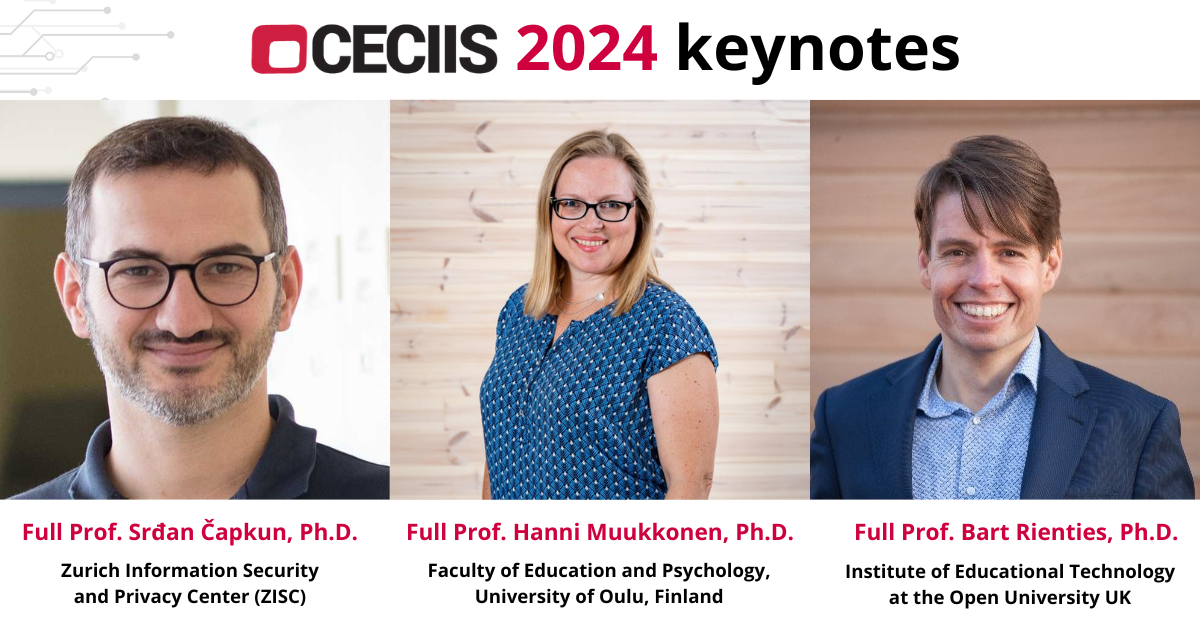CECIIS 2024 keynote speakers announced
Full Prof. Srđan Čapkun, Ph.D.
Zurich Information Security and Privacy Center (ZISC)
Srdjan Capkun (Srđan Čapkun) is a full professor in the Department of Computer Science, ETH Zurich and Chair of the Zurich Information Security and Privacy Center (ZISC). Originally from Split, Croatia, he received his Dipl. Ing. Degree in Electrical Engineering / Computer Science from the University of Split in 1998, and his Ph.D. degree in Communication Systems from EPFL in 2004. His research interests are in system and network security. His focus areas are wireless security (in particular secure positioning), and system security where he focuses on trusted computing and blockchain technologies. He is a co-founder of 3db Access (acquired by Infineon in 2023), which focused on secure distance measurement and proximity-based access control, and of Futurae, a company focusing on usable on-line authentication. In 2016 he received an ERC Consolidator Grant for a project dedicated to securing positioning in wireless networks (www.securepositioning.com). He is a fellow of the ACM and of the IEEE.
Theme:
The theme will be announced soon.
Full Prof. Hanni Muukkonen, Ph.D.
Faculty of Education and Psychology, University of Oulu, Finland
Hanni Muukkonen, Ph.D. is a professor in Educational Psychology at the Faculty of Education and Psychology, University of Oulu, Finland. Her research focuses on collaborative learning, knowledge creation, learning analytics, and ethics in AI. Muukkonen’s research has widely contributed (>100 peer reviewed publications) to understanding interaction between learning design, technology-mediated collaboration, and students’ competences in co-creation and interdisciplinary collaboration. An example is the EARLI Emerging Field Group funding: Unpacking collaboration - Multimodal collaboration analytics and mixed methods designs for exploring collaborative problem solving (2022-24). In recent projects, she has focused on learning analytics and AI in education to investigate support for students’ academic paths and advanced understanding of student transitions across educational levels. She has recently contributed as a member in the European Commission Expert group on Artificial Intelligence and Data in education and training. Orcid: 0000-0002-1086-1352.
Theme:
Stakeholder perspectives of learning analytics and AI development and implementation in education
Full Prof. Bart Rienties, Ph.D.
Institute of Educational Technology at the Open University UK
Dr. Bart Rienties is Professor of Learning Analytics and programme lead of the learning analytics and learning design research programme at the Institute of Educational Technology at the Open University UK. He leads a group of academics who provide university-wide learning analytics and learning design solutions and conduct evidence-based research of how students and professionals learn. As educational psychologist, he conducts multi-disciplinary research on work-based and collaborative learning environments and focuses on the role of social interaction in learning, which is published in leading academic journals and books. His primary research interests are focussed on Learning Analytics, Professional Development, and the role of motivation in learning. Furthermore, Bart is interested in broader internationalisation aspects of higher education. He has successfully led a range of institutional/national/European projects, and has received a range of awards for his educational innovation projects. He is President of the Society of Learning Analytics Research (SoLAR), the largest researcher community on learning analytics. He has published over 300 academic outputs, and is the 1st most published and cited author on learning design and learning analytics in the period 2014-2023 (Drugova et al. 2023), the 2nd most published author on Networks in Education in period 1969-2020 (Saqr et al. 2022), and the 3rd most published author on EdTech in the period 2002-2022 (Aaradhi & Chakraborty, 2023).
Theme:
Why culture matters in Information and Intelligent Systems
In the last decade across the globe thousands of educators and designers have designed, tested, implemented and evaluated various IT and intelligent systems. In some cases these systems were developed primarily for one setting or context, others might have scaled their approach at a cultural/regional/national context, while in some cases these systems were designed from the beginning as a cross-cultural or perhaps even global system. However, whether IT and intelligent systems can be copy/pasted from one to another context has been criticised from both research and practice. In this keynote I aim to reflect on three case-studies where a particular system has been adapted, adopted, and/or fine-tuned to a different context. First, I will reflect on how a learning analytics tool to detect early drop-out, while successful in one large institution, has not necessarily gained traction in other countries despite being one of the few examples of large-scale learning analytics adoption. In the context of learning design various tools have been developed over the years, but few have been implemented across different institutions and national borders. Finally, our recent work on a game-based learning app for pre-school children that is successful in a Western context is currently being tested in African and South American contexts. In this keynote I will critically reflect on the lessons learned and whether Gen AI approaches could perhaps facilitate or hinder IT and intelligent system adoption across borders.
-
Previous article
CECIIS 2024 - propose your events -
Next article
Paper submission deadline extended – June 30, 2024
